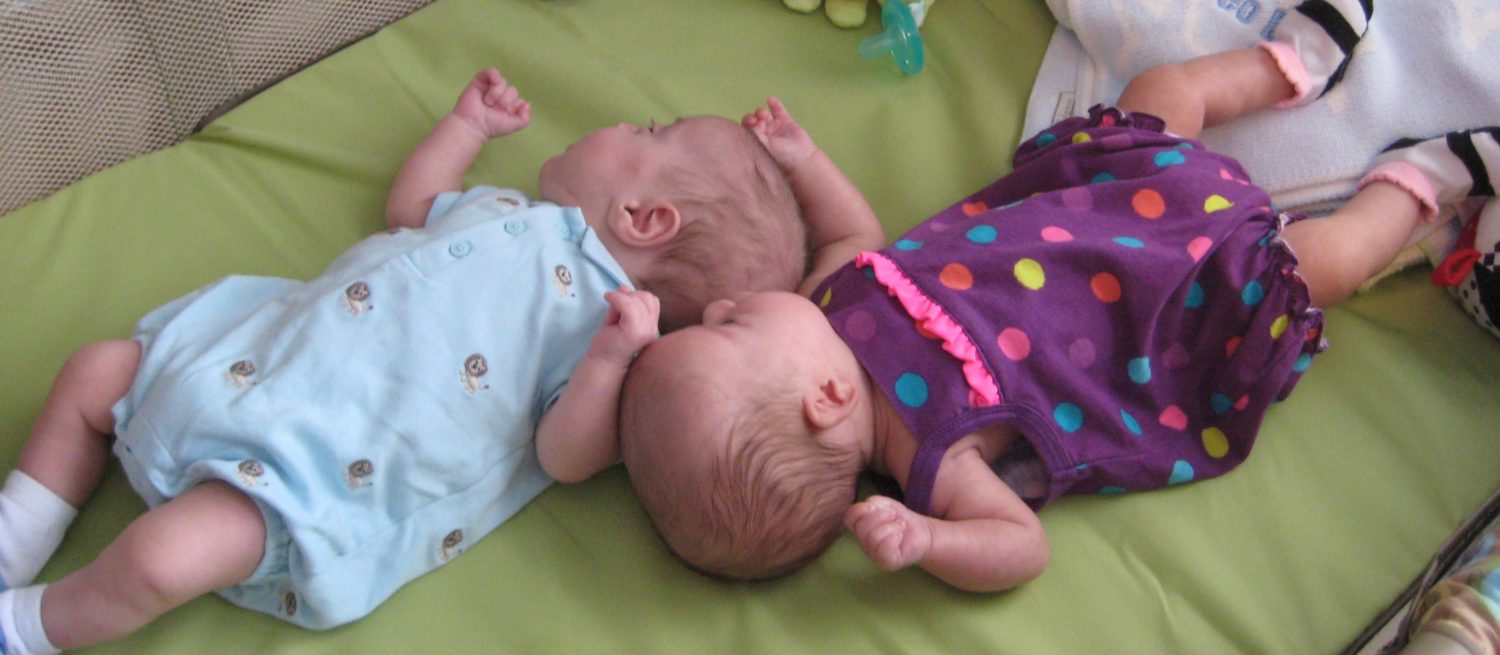
We were all reunited on our son’s Gotcha Day.
Birth day: a day to celebrate the birth of your child
Gotcha day: a day to celebrate taking your child home; i.e. “getting them”
Some of us don’t leave the hospital three – five days after giving birth with typically eating, breathing, growing babies. Yet, many of us are lucky enough to eventually leave the hospital with our babies. Incredible medical advances, extraordinary NICU teams, and sheer luck make this possible. Infants of all gestational ages admitted to a special care unit (e.g. NICU) spend an average of 13.2 days, ranging from 4.9 days (39-41 weeks) to 46.2 days (<32 weeks).1
On May 16, 2012, I gave birth to micropreemie twins (28d5w), after two and a half weeks weeks on hospitalized bed rest. My daughter weighed in at 1020 grams and my son at 1050 grams. I remember well the irony of being told that they were robust for 28-week multiples. Before the start of bed rest, I had a relatively uncomplicated multiples pregnancy, aside from the super complicated task of getting pregnant. They were delivered on a sunny day a bit before 1 p.m. by emergency c-section. “Born This Way” by Lady Gaga played on the radio.
While I wanted so much to be a mother, birth day was bittersweet. It was clear no one was excited about this emergency delivery of multiples. This was not a joyous event greeted by congratulations or envy. I had been stalwart on bed rest and rode the stretcher into the OR like a warrior with armor. This persona pervaded my days as a mother of super-fragile micropreemies in two different NICUs. My son was taken hours after birth to the children’s hospital down the road. This incredibly fragile micropreemie was found also to have a congenital diaphragmatic hernia, a condition which causes a hole to form in the diaphragm and for organs below to float into the chest cavity alongside the lungs.
Skipping past the months of worry and terror and apprehension in each NICU, past the unique protocols and best practices in each; past hard-won breathing and eating assisted by technology; machinery, and wires, past those first exhausting months at home: feeding each baby every 3 hours, going to innumerable appointments, hosting a visiting home nurse multiple times each week, enduring constant tests and scans, staying quarantined at home to avoid re-hospitalization at all costs, hosting strangers at home every day to work on developmental growth, we arrived at their first birthdays.
A huge milestone. On an average day in the United States, 64 babies die before reaching their first birthday.2 We gathered close family together and celebrated with homemade macaroni and cheese and their first bites of ice cream. Yet, a gnawing feeling had begun growing in my stomach months before, different from the daily gnaw I felt as a new mother, as a new mother of former micropreemies, as a new mother of kids with special needs. I eventually came to recognize these months before their birth day as what they initially were for me – a period of anticipating the anniversary of a birth and NICU aftermath that was full of terror and anxiety. These feelings would faithfully surge each year.
In the middle of this first surge, in the months before their first birthday, a blurred conversation with a volunteer NICU parent mentor brought to light an idea we revel in: Gotcha Day. As the afternoon turned to evening and I sat talking to her on the floor of the sunroom-turned-playroom with two amazing babies who exhausted me in every way, she talked about how she celebrated birth day for her former preemie and Gotcha Day for herself. I was hooked.
In the early years, Gotcha Day was clearly something for me and my husband. A recognition that birthday celebrations were expected “out there” but that Gotcha Days were what we really yearned for. Of course, at one year old, neither of my kiddos understood birthdays or Gotcha Days. However, as they have gotten older and we share their stories – more each year – they have come to understand and enjoy this milestone all their own.
So, every year, 72 and 90 days after their birth day we celebrate the day that for us was another birth of sorts. At the 90-day post-birthday mark, we celebrate our son’s arrival home but also the anniversary of our twins being reunited – and of us all being together at home, at last. In many ways, Gotcha Day for us is a more true anniversary of each year’s passing, with all its sweetness, and struggle, and triumph.
Birth day is bittersweet, though that has softened over time.
Gotcha Day is always celebratory, strength-affirming, and honors each of them as themselves.
